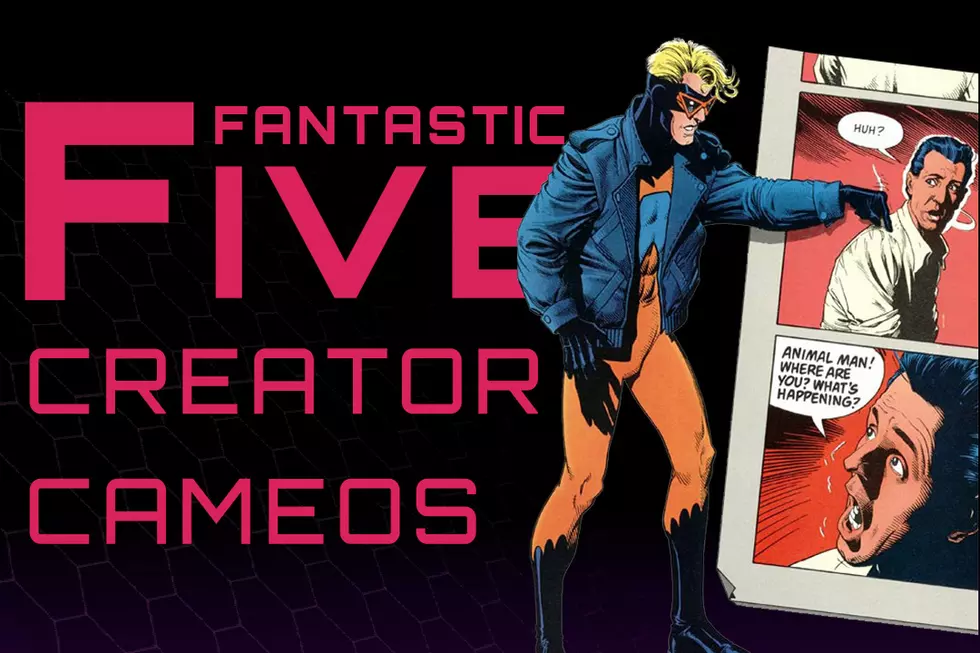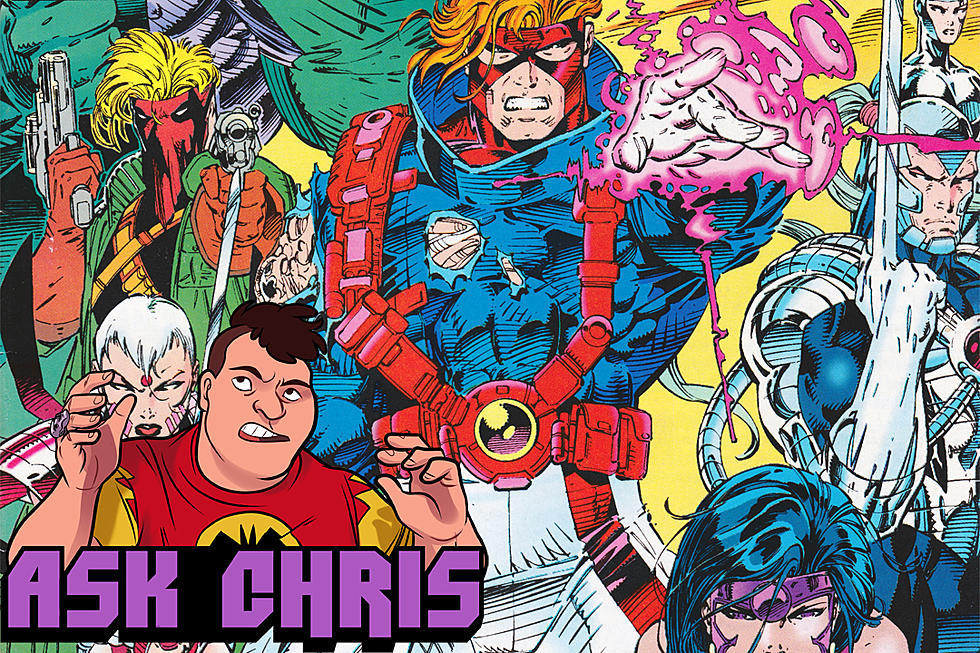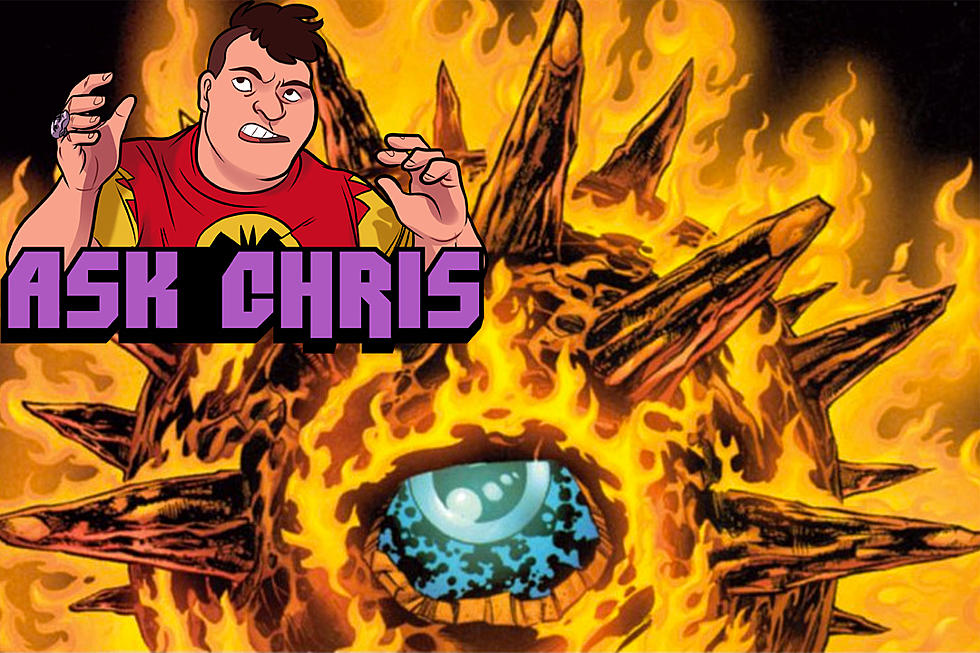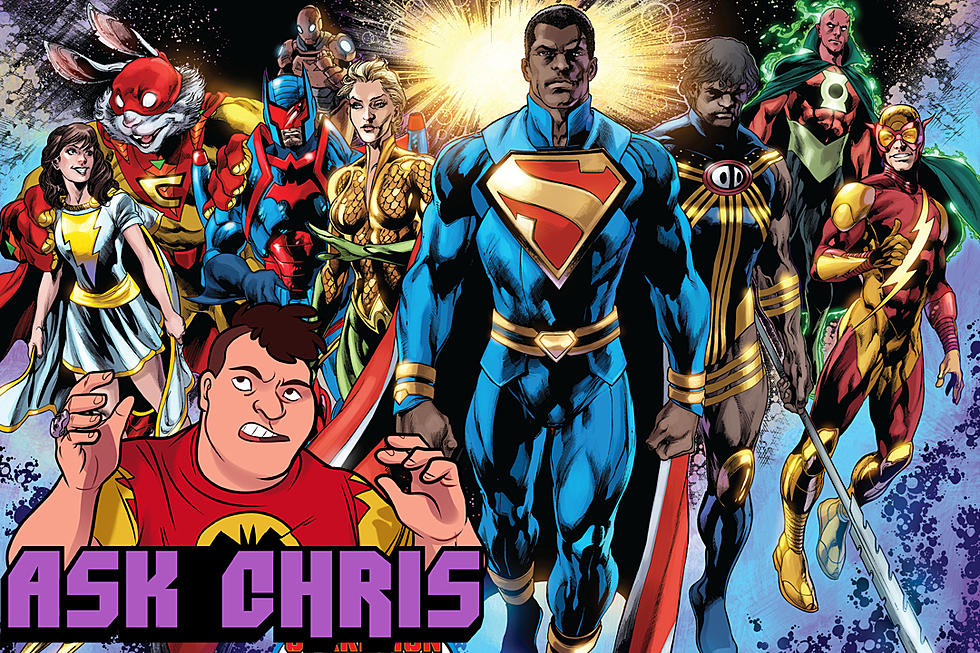![Alan Moore on the Difference Between Adapting Works and ‘Stealing Characters’ [Video]](http://townsquare.media/site/622/files/2012/02/alan-moore-screen-shot.png?w=980&q=75)
Alan Moore on the Difference Between Adapting Works and ‘Stealing Characters’ [Video]

Alan Moore has been the subject of the dominant conversation in the comics blogosphere for the last week or so, thanks to publisher DC Comics' announcement that it has finally decided to actually go through with the production a 34-issue suite of Watchmen prequels by other creators More interesting than any conversation about the esteemed Watchmen writer, however, is a conversation with Alan Moore, which you can observe in a two-and-a-half hour video recording of Moore answering fan questions for charity.
During the first half hour, you can see Moore discuss why and why he's "not very interested" in Grant Morrison, and perhaps most relevant to the Watchmen discussion, what he thinks is the important difference between "adapting" and "stealing" characters created by others.
The video was filmed at a charity event for Harvey Pekar's widow (and collaborator) Joyce Brabner's campaign to raise at least $30,000 for a sculpture of the late writer to be installed in one of his local libraries. Supporters who donated at least $99 could send an "impertinent question" and enjoy "A Cup of Tea and a Long Winter's Chat with Comics Giant Alan Moore," as the writer answered the question during an invitation-only online video chat. The subjects were wide-ranging, including Pekar and his influence, the practice of magic and his past and future work.
Moore is a smart, funny man who's always worth paying attention to, so if you've got the time to spare, the video is well worth a watch (the herky-jerky visuals that make it look like the writer is communicating from a rocket on its way to a moon-landing rather than from Northampton aside). If you don't, don't worry, we watched it for you, and cobbled together some highlights.
One questioner asked Moore about how he can, on one hand, express such displeasure at current comics creators revisiting his own work to expand upon ("You can say that again," Moore pauses to say while reading the question aloud), while he himself has used so many pre-existing creators in his own works like The League of Extraordinary Gentlemen comics. The question referred specifically to DC's recent Green Lantern comics rather than the announced Before Watchmen project, but given how often the same question has been bandied about online in the past few days, it's worth paying special attention to Moore's answer:
In terms of comics, yes. When I entered the comics medium, I preferred creating my own characters, things like Halo Jones and stuff like that. But the nature of the comics medium at the time was that you were handed other people's characters. And at the time, I didn't see anything wrong with that. I was handed Swamp Thing by Len Wein, who was the creator, and he seemed to be quite happy with me to change it around and make it a new concept that I was quite happy working with.
All of these things, it was the way that comics worked and after a while I began to have doubts about that. I can remember when I was offered-this was with Brian Bolland-the Batman/Judge Dredd team-up and this was something that was going to happen until I had a word with John Wagner, who was a very good friend of mine and who -- he may not have been the creator of Judge Dredd, but he was the person most associated with its success -- John told me that he was very angry to hear that I would be taking this Judge Dredd character, which was not what I had been told, so I dropped the project on the instant because I don't believe in taking work from other people.
I eventually got to the point where I felt uncomfortable dealing with any franchise character, and a few years ago I stopped. I decided that I would probably never work with any franchise character again...
When you get to the literary field, which is something different to comics, in literature almost as far aback as literature goes, there has been a tendency to take characters that are obsolete or where the authors have died. If you look at the Orlando character from The League, this is someone who was originally a swipe from the Legends of Roland. Roland becomes Orlando and we then find that someone does Orlando Furioso. Its followed another 80 years later by someone who does Orlando Innamorato. Then Virginia Woolf comes along a few hundred years later and decides to create the character as her dual gender character Orlando...
It might be splitting hairs, but I'm not adapting these people, these characters. I'm not doing an adaptation of Dracula or King Solomon's Mines. What I am doing is I'm stealing them. There is a difference between doing an adaptation, which is evil, and actually stealing characters, which is, as long as everybody is dead or you don't mention the names, is all right by me...
With comics characters that have been created by cheated old men, I feel that is different...
When asked about specific works of Pekar's that have inspired his own comics, Moore immediately named Harvey Pekar's Cleveland, a book with art by Joseph Remnant and an introduction by Moore that will be published this spring:
That was perhaps the most accomplished and soulful piece that Harvey has ever done. I was immensely impressed by that. For somebody to be talking about their home location in all of that detail. I love that stuff. And from back in the American Splendor days there's always one piece which i particular remember it's just Harvey on a hot day, going into the kitchen. And he gets one of those metallic...things of lemon concentrate, lemonade concentrate, squeezes it into a glass, turns on the tap, and you see the water splashing down to the glass, filling it up and he stirs it and there's just got a shot of him drinking a cold glass of lemonade on a hot day. And it really evokes how good it feels. Such a simple human action. And he was able to get it down with no words and a few pictures so that any human being in the western world, and probably far beyond, could look at it and relate to it and yeah, that is what being human is all about. Drinking cold lemonade on a very hot day.
As to whether Moore would ever follow Pekar's pioneering example of creating autobiographical comics, Moore noted that if he did it now, it would seem like "grandstanding."
If you've got a snake worshiper that looks like me crashing into a story, it would lose any sense of realism and it would just be about me.
Moore was also asked about the other "acclaimed comic book writer from the UK to also be a vocal magician," Grant Morrison, "who has never been terribly shy about his views on you and your work." "Can we possibly draw you out on your views on him and his work?" the question asked.
Moore laughed before reading it aloud, paused a moment, and responded carefully:
Well, let me see. The reason I haven't spoken about Grant Morrison generally is because I'm not very interested in him. I don't really want to get involved with a writer of his caliber in some sort of squabble. For the record, since you asked, the first time I met him, he was an aspiring comics writer from Glasgow. I was up there doing a signing or something, they asked if I could perhaps, if they could invite a local comics writer who was a big admirer of mine along to the dinner. So I said yeah. This was the only time I'd met him to speak to him, I think.
He said how much he admired my work, how it inspired him to want to become a comics writer. And I wished him the best and said I'd look out for his work. When I saw that work in 2000AD I thought that, "This seems as if it's a bit of a cross between Captain Britan and Marvelman, but that's probably something that he'll grow out of." It was on that basis that I recommended him to [Vertigo Editor] Karen Berger...
Then there started kind of a strange campaign of things in fanzines where he was expressing his ideas of me, as you put it. He liked to explain this by that when he started writing, he felt that he wasn't famous enough, and a good way of becoming famous would be to say nasty things about me. Which I suppose is a tactic. Although not one that I'm likely to appreciate.
At that point, after I'd seen a couple of things and they seemed incredibly derivative, I decided to stop bothering reading his work. And that's largely sort of proven successful.
And that's all just within the first half hour or so.
[Via Bleeding Cool]
More From ComicsAlliance









